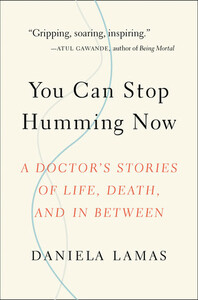Take a photo of a barcode or cover
36 reviews for:
You Can Stop Humming Now: A Doctor's Stories of Life, Death, and in Between
Daniela Lamas
36 reviews for:
You Can Stop Humming Now: A Doctor's Stories of Life, Death, and in Between
Daniela Lamas
emotional
hopeful
reflective
sad
medium-paced
Stories were well-written, but I didn’t see much thread between them.
This was a hard read honestly. If you are looking for sugar coating of serious health problems this is not the book for you. This is the blunt, descriptive truth of what no one talks about. The in between of severe illness, dying, death, surviving, and medical PTSD. Was it worth it as someone with a chronic illness with no cure? Absolutely.
A bunch of disjoint stories.
For [a:Atul Gawande|3078|Atul Gawande|https://images.gr-assets.com/authors/1409146675p2/3078.jpg] having endorsed the book, I had higher expectations from the writing style. I felt that it was too dry... to clinical... too disconnected.
#1, #2 and #9 drew me and tried to establish a connection between me, a reader, and patients and their families' experiences.
The rest read like notes at the end of her rotation!
I'm in no way dismissing the passion the author has for her work, and/or life in the ICU.
I just didn't see what point this entire book was trying to make!
For [a:Atul Gawande|3078|Atul Gawande|https://images.gr-assets.com/authors/1409146675p2/3078.jpg] having endorsed the book, I had higher expectations from the writing style. I felt that it was too dry... to clinical... too disconnected.
#1, #2 and #9 drew me and tried to establish a connection between me, a reader, and patients and their families' experiences.
The rest read like notes at the end of her rotation!
I'm in no way dismissing the passion the author has for her work, and/or life in the ICU.
I just didn't see what point this entire book was trying to make!
A fascinating look into what happens after modern medicine saves lives.
This is a book about what its like to be a doctor. It is a funny but also serious book which will have you crying with laughter one page and then crying from sadness at the next. This allows an insight to what doctors truly go for and may change how you engage with them in the future.
I listened to this one and particularly liked the discussion of PTSD as experienced by people in the ICU. There are also interesting stories and interviews for other advanced life saving technologies that dramatically change the patient’s quality of life. The book humanizes many of our medical advances.
emotional
hopeful
inspiring
reflective
fast-paced
Maybe it's me. I stopped reading this book about 2 anecdotes in. It's like romance/suspense books--so few authors do it as well as Mary Stewart, that they're just not worth reading. Having inhaled (over and over) Oliver Sacks' and Atul Gawande's books, this one is just.not.there. IMO, she could be, someday. There's talent here--it's a gift to not only be able to retain the humanity of medicine, but also to be able to convey it to laypeople in ways that demonstrate the poignancy without the sheer terror that comes with so much illness. IMO, she needed a more ruthless editor. The stories I read were repetitive in some of their content; they need tightening. But there is also this: I'm too old and jaded in healthcare to bring the appropriate level of awe to these stories. I found myself critiquing the actual plans of care... ye gods. Spare me that. So, give it a go. You may love it. I may try again another time. She should keep writing, but be ruthless in her editing.
This was a great look into the care that goes into treating someone in the ICU. It touched on the reality of the trauma that patients go through, and also mentioned that just because they survive the ICU, it doesn't always mean they go on to live a successful life. I loved the honesty of the author and enjoyed her writing style.



